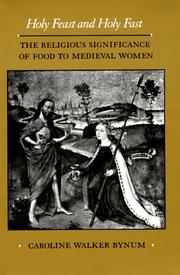| Listing 1 - 1 of 1 |
Sort by
|

ISBN: 0520057228 0520063295 128007891X 9786613520180 0520908783 0585326487 9780520908789 9780585326481 9780520057227 9780520063297 9781280078910 6613520187 Year: 1987 Volume: vol 1 Publisher: Berkeley: University of California press,
Abstract | Keywords | Export | Availability | Bookmark
 Loading...
Loading...Choose an application
- Reference Manager
- EndNote
- RefWorks (Direct export to RefWorks)
In the period between 1200 and 1500 in western Europe, a number of religious women gained widespread veneration and even canonization as saints for their extraordinary devotion to the Christian eucharist, supernatural multiplications of food and drink, and miracles of bodily manipulation, including stigmata and inedia (living without eating). The occurrence of such phenomena sheds much light on the nature of medieval society and medieval religion. It also forms a chapter in the history of women. Previous scholars have occasionally noted the various phenomena in isolation from each other and have sometimes applied modern medical or psychological theories to them. Using materials based on saints' lives and the religious and mystical writings of medieval women and men, Caroline Walker Bynum uncovers the pattern lying behind these aspects of women's religiosity and behind the fascination men and women felt for such miracles and devotional practices. She argues that food lies at the heart of much of women's piety. Women renounced ordinary food through fasting in order to prepare for receiving extraordinary food in the eucharist. They also offered themselves as food in miracles of feeding and bodily manipulation. Providing both functionalist and phenomenological explanations, Bynum explores the ways in which food practices enabled women to exert control within the family and to define their religious vocations. She also describes what women meant by seeing their own bodies and God's body as food and what men meant when they too associated women with food and flesh. The author's interpretation of women's piety offers a new view of the nature of medieval asceticism and, drawing upon both anthropology and feminist theory, she illuminates the distinctive features of women's use of symbols. Rejecting presentist interpretations of women as exploited or masochistic, she shows the power and creativity of women's writing and women's lives.
Food --- Women --- Food habits --- Aliments --- Femmes --- Habitudes alimentaires --- Religious aspects --- Christianity --- History --- Aspect religieux --- Christianisme --- Histoire --- Social history --- Eglise catholique --- History of doctrines --- 248.153.4 --- 396 "04/14" --- -Social history --- -Food --- -Food habits --- -Eating --- Food customs --- Foodways --- Human beings --- Habit --- Manners and customs --- Diet --- Nutrition --- Oral habits --- Foods --- Dinners and dining --- Home economics --- Table --- Cooking --- Dietaries --- Gastronomy --- Descriptive sociology --- Social conditions --- Sociology --- Human females --- Wimmin --- Woman --- Womon --- Womyn --- Females --- Femininity --- Vasten. Versterving. Onthouding --- Feminisme. Vrouwenbeweging. Vrouw en maatschappij--Middeleeuwen --- -Religious aspects --- -Christianity --- -History of doctrines --- -History --- -Vasten. Versterving. Onthouding --- 396 "04/14" Feminisme. Vrouwenbeweging. Vrouw en maatschappij--Middeleeuwen --- 248.153.4 Vasten. Versterving. Onthouding --- Christianity. --- -248.153.4 Vasten. Versterving. Onthouding --- Eating --- History of civilization --- Christian spirituality --- anno 1200-1499 --- Middle Ages, 500-1500 --- Primitive societies --- Food - Religious aspects - Christianity --- Women - History - Middle Ages, 500-1500 --- Food habits - History --- Aliments - Aspect religieux - Eglise catholique --- Femmes - Histoire - 500-1500 (Moyen Age) --- Habitudes alimentaires - Histoire --- Food - Religious aspects - Christianity - History of doctrines - Middle Ages, 600-1500 --- Social history - Medieval, 500-1500 --- Food habits - History - To 1500 --- anthropology. --- catholicism. --- devotional practices. --- eucharist. --- fasting. --- feminism. --- feminist theory. --- food studies. --- food. --- gender studies. --- gender. --- historiography. --- history. --- inedia. --- medieval asceticism. --- medieval religion. --- medieval society. --- medieval women. --- middle ages. --- miracles. --- mysticism. --- nonfiction. --- piety. --- religion. --- religiosity. --- religious studies. --- religious vocation. --- religious women. --- renunciation. --- saints lives. --- saints. --- stigmata. --- symbolism. --- western europe. --- women and religion. --- womens lives. --- womens studies. --- womens writing. --- world history. --- MEDIEVAL CIVILIZATION --- WOMEN --- HABITUDES ALIMENTAIRES --- HISTORY --- MIDDLE AGES, 500-1500 --- MOYEN AGE
| Listing 1 - 1 of 1 |
Sort by
|

 Search
Search Feedback
Feedback About UniCat
About UniCat  Help
Help News
News